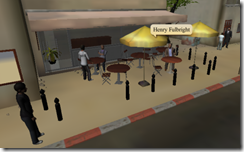3 professional development opportunities, and they’re all free
 In these austere times, free is good, right? Here are three sources of professional development that you will, I’m sure, find useful.
In these austere times, free is good, right? Here are three sources of professional development that you will, I’m sure, find useful.
Another year, another BETT
Guidance for the BETT Show (and other conferences)
Last year I published a guide to BETT (and other conferences) for subscribers to the free newsletter, Computers in Classrooms. I think the advice is still relevant. I looked at the following:
- 9 reasons to attend.
- 4 arguments to put to your boss as to why you should be allowed to attend.
- 3 other kinds of colleagues who should attend.
- 13 things to do in advance.
- 16 ways to get the most out of the show.
- 7 ways to follow up afterwards (once you’ve recovered!).
You can read that online here.
Prize Draw
Creating a game – a positive impact on learning?
Games-based learning: a personal view
by Amanda Wilson

Six months ago, writes Amanda Wilson, I would have said that games in the class were not a way for children to learn mainly because I never thought of them as educational tools. I never really connected education with entertainment.
It’s Not About The Game!
Battling the barriers of games-based learning
 Pupils tend to want games that look fun and will not consider the educational aspect; teachers tend to want a very structured approach that compliments the vision of the subject they are delivering. Trying to deliver content we think suits both the learner and the teacher has been a difficult challenge.
Pupils tend to want games that look fun and will not consider the educational aspect; teachers tend to want a very structured approach that compliments the vision of the subject they are delivering. Trying to deliver content we think suits both the learner and the teacher has been a difficult challenge.
Games in Education
Computers in Classrooms out now!
Quick Looks
Newsletter: Games-Based Learning #1
Computers in Classrooms Almost Ready
Prize Draws
 In the very near future (read on) I will be running prize draws for the following:
In the very near future (read on) I will be running prize draws for the following:
Computers in Classrooms September Issue Out Now!
Conference Concessions and Other Goodies
Computers in Classrooms July Edition Out Now!
Because of pressures of work, together with wanting to make sure that contributors' articles were read by as many people as possible, I decided to defer the special games-based learning issue and bring out a short newsletter to give people something to read quickly as they're winding down for the summer.
Unfortunately, one of the links given is incorrect. It worked for me, but that's because, I realise now, I was logged in to the website. The mobile phones article is here. Thanks to Jonathan Thomson of BLI Education for emailing me about the broken link.
Here is what was covered in this issue:
Marxio Out, TimeLeft In (Maybe)
Those links will take you to the individual articles, but if you wish to read the whole newsletter, you'll find it here. You can also subscribe, by going to the newsletter page -- it's free! -- where you will also find an archive of past issues.
Please feel free to pass on this information to your friends and colleagues. Thank you.
Let Them Ask
 Doug Woods looks at how technology can help learners ask questions.
Doug Woods looks at how technology can help learners ask questions.
Asking questions is very much a part of the learning process and there are ways in which we can use educational technology to support this. It is surprising therefore to see that the way questioning is handled in schools and colleges seems to have changed little in the last fifty years. Up and down the country, you will still see learners asking questions by first raising their hand and waiting for the teacher to acknowledge them. Is this the best way?
The first problem with having to raise your hand to ask a question is that you have to be physically present and make yourself visible to the professional (teacher, lecturer, etc.) leading the session. So what happens if the question occurs to you when doing homework or revising? What happens if you are absent and/or accessing the session remotely? In such circumstances, simply raising your hand is not an option and the ability to ask your question could be lost.
Then there are some sessions or lessons where you feel you can only ask questions at a certain time; usually at the end. A question may occur to you during a session but, when the lecturer finishes by asking ‘does anyone have any questions?' you find you've forgotten what it was! Or maybe you can remember it but there are so many other people asking questions that you do not get time to ask yours. Then, of course, there are those times when you want to ask your question at the end but you know that you, and everyone else, are simply dying to get away, so you stay quiet.
There are also times when a question occurs to you after the session. Perhaps you've been thinking about the session afterwards and something occurs to you, or maybe you read something elsewhere, which leads you to question something you heard, or thought you heard, during the session. How then could you ask your question? Maybe you experience something, perhaps from some practical work related to the session, which doesn't quite fit with what was mentioned in the session, how can you raise this?
Then there are those times when you want to ask a question of one of your fellow learners. How can you do that in a session if all your attention is directed toward the teacher/lecturer?
I daresay we can all relate to instances such as these, or we can recall times when we were dying to ask a question and, for some reason, didn't. Speaking for myself, I know that I cannot put my hand on my heart and say that every question I didn't ask would have been a serious one. Furthermore, I cannot be certain that, by not asking the question, I missed out on some new information or level of understanding. There is always the possibility, though, that had I asked the question(s) I wanted to, my level of attainment could have been better.
Having established the importance of asking questions and set out some of the traditional difficulties of doing so, we have to ask ‘how can educational technology help learners ask their questions?'
Ideally, I suppose we could be looking for a piece of technology, which could be used during a session and afterwards, for a piece of technology that can be used equally by those attending the session as well as those absent or accessing the session remotely. This piece of technology would need to be accessible and available to all, so that questions and answers can be shared and so that no advantage is given to certain users but not others.
There could be several possible solutions but one which I'd like to put forward is the use of online discussion forums. What I'd like to suggest is that every subject, every project or topic, should have a forum associated with it. I'd like to think that this could work at Higher, Further and Secondary school level (Key stage 3 onwards, ie 11 years old +) and increasingly also at Key stage two (7 to 11 years of age).
So, what advantages would having an online discussion forum bring? First of all, the discussion forum would be open to all learners, including those who might be absent at the time of the actual session and any who needed to access the session remotely. This would mean that all learners could pose their questions on the forum and feel disadvantaged because they might have been unable to attend the session.
Questions can be posted to the forum at any time, so learners doing homework, coursework or revision could pose questions as and when they occur.
Questions and answers can be shared among all learners. In a lesson, a teacher might respond to an inbridual learner's question singly (i.e. giving only that learner a response) not knowing that others may also require the same answer, on a discussion board the response is available for all who need it.
A question need not be only asked of the teacher/lecturer but can also be asked of other learners. Other learners can also give their response to questions; this might have some appeal as it could mean that the teacher does not always have to be on hand to supply the answers. It also affords an opportunity for other learners to demonstrate their learning.
There is an added bonus in that each time the forum is added to; it becomes a resource which can be used in follow up sessions this year or in subsequent years.
We have to acknowledge that discussion forums are not perfect. They can be abused, some people may tend to dominate discussions and some are reluctant to make posts. However with only a simple level of monitoring, moderation and encouragement, an online forum can become a very effective tool and future learning resource.
Doug Woods http://dougwoods.co.uk/blog says:
I'm a former teacher who's always been passionate and enthusiastic about ICT in education. I now style myself as an ICT in Education Consultant and Trainer, a role has afforded me opportunities to work in new areas of educational ICT for both public and commercial sectors. I have a keen interest in ICT for SEN learning, inclusion and for transforming learning.
This article first appeared in Computers in Classrooms, the free e-newsletter for ICT/ed tech teachers and subject leaders. Please see this article for details of three great prizes to be given away to subscribers. The next issue will be a games-based learning special.
Games-Based Learning Newsletter: 2 Great Prizes
Thanks to the generosity of Immersion and SeriousGames, I am able to offer two wonderful prizes to subscribers of Computers in Classrooms. The prizes on offer are a copy of Immersion’s MissionMaker, the games authoring software, and a one year school license for SeriousGames Global Conflicts: portal. The two winners will be chosen in a random draw on Thursday 11pm UK time. For terms and conditions please see the newsletter page, where you can sign up too if you wish (it’s free!). In this case, each prize is available to non-UK residents as well as Brits!
More information on the contents of the games education special issue will be posted here as soon as I’ve finalised the list of articles that will be included.
I've also been offered two premium Xobni licences to give away, as a "thank you" for the review I wrote. I will pull two winners out of a digital hat for these as well.
Disclaimer: I was not expecting anything like this. The review was genuinely independent, and not wrtten for any reward from Xobni.


